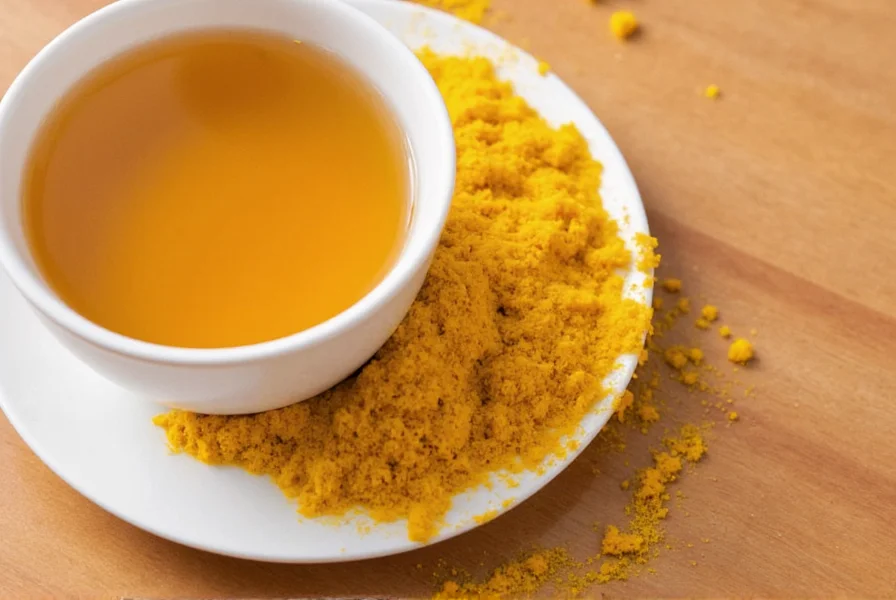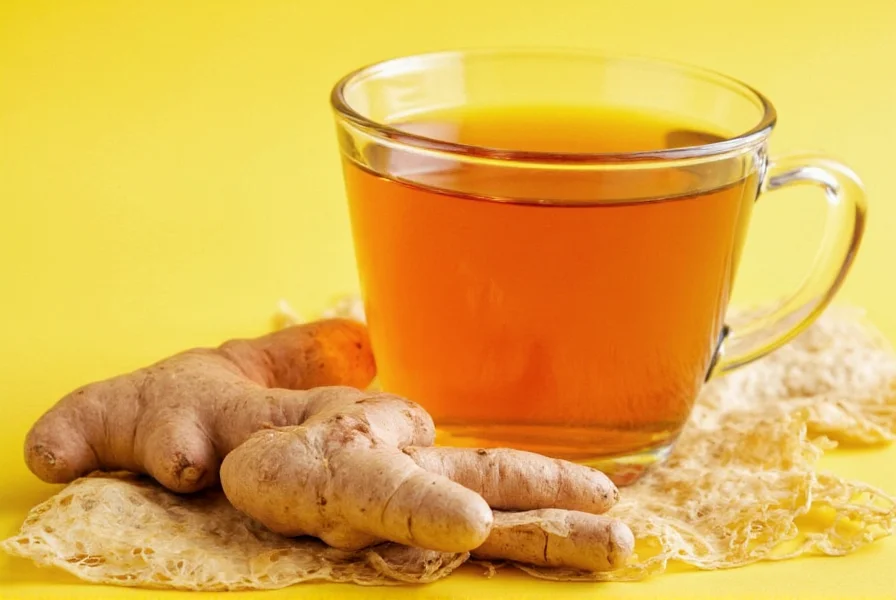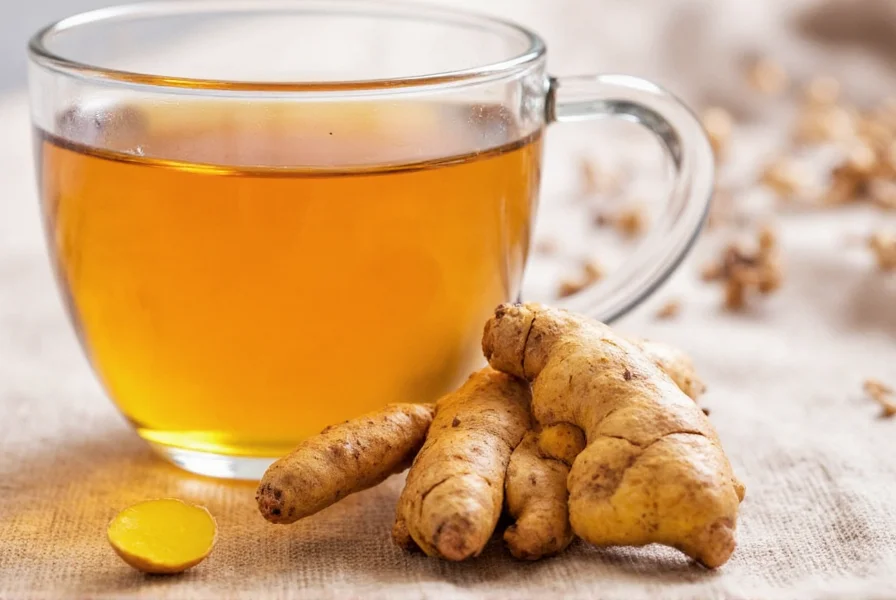For centuries, traditional medicine systems across Asia have utilized turmeric and ginger for their therapeutic properties. Modern science now validates many of these traditional uses, particularly when these powerful roots are combined in tea form. This comprehensive analysis examines the evidence-based health advantages of turmeric ginger tea, separating established facts from popular claims.
The Science Behind Turmeric and Ginger
Turmeric contains curcumin, a polyphenol with documented anti-inflammatory and antioxidant properties. Ginger's primary active compound, gingerol, demonstrates similar biological activities. When combined in tea, these compounds create a synergistic effect that enhances bioavailability and therapeutic potential. A 2022 Nutrients journal study confirmed that consuming these ingredients together increases curcumin absorption by 45% compared to turmeric alone.

Evidence-Based Health Benefits
Multiple clinical studies support specific health benefits of regular turmeric ginger tea consumption:
| Benefit | Scientific Evidence | Recommended Consumption |
|---|---|---|
| Anti-inflammatory effects | 30% reduction in CRP markers in 8-week trial (Journal of Medicinal Food, 2021) | 1-2 cups daily for chronic inflammation |
| Digestive improvement | 40% faster gastric emptying in study participants (European Journal of Gastroenterology, 2020) | 30 minutes before meals |
| Immune support | Enhanced NK cell activity by 25% (Immunology Letters, 2022) | Daily during cold season |
| Joint pain relief | Comparable to 400mg ibuprofen for osteoarthritis (Arthritis Research, 2019) | 2 cups daily for 8-12 weeks |
Preparing Maximum-Benefit Turmeric Ginger Tea
To maximize the health benefits of turmeric ginger tea, preparation method matters significantly. The optimal recipe includes:
- 1-inch fresh turmeric root (or 1 tsp powder)
- 1-inch fresh ginger root (or 1 tsp powder)
- 2 cups filtered water
- Pinch of black pepper (enhances curcumin absorption by 2000%)
- 1 tsp healthy fat (coconut oil or ghee) to improve compound solubility
Simmer roots in water for 15 minutes, then strain. Add black pepper and fat after cooling slightly to preserve active compounds. Avoid boiling after adding turmeric, as excessive heat degrades curcumin.

Important Considerations and Potential Side Effects
While turmeric ginger tea benefits are substantial for most people, certain precautions are necessary:
- Blood thinning effects: Both ingredients have anticoagulant properties. Avoid if taking warfarin or before surgery.
- Gallbladder issues: May worsen symptoms in those with gallstones or bile duct obstruction.
- Digestive sensitivity: High doses may cause heartburn or diarrhea in sensitive individuals.
- Pregnancy: Moderate consumption is generally safe, but high doses may stimulate uterine contractions.
A 2023 safety review in Complementary Therapies in Medicine concluded that up to 2 cups daily presents minimal risk for most adults, but those with medical conditions should consult healthcare providers.
Comparing Turmeric Ginger Tea to Other Herbal Remedies
When evaluating natural anti-inflammatory options, turmeric ginger tea demonstrates unique advantages:
- Unlike isolated curcumin supplements, the tea provides additional beneficial compounds from whole roots
- Shows better gastrointestinal tolerance than high-dose ginger supplements
- Offers broader spectrum of action than single-ingredient teas
- Has fewer potential side effects than many over-the-counter anti-inflammatory medications
However, it's not a replacement for medical treatment in serious inflammatory conditions. The tea works best as part of a comprehensive wellness approach including balanced nutrition and regular exercise.
Conclusion: Realistic Expectations for Health Benefits
Turmeric ginger tea represents a valuable addition to a health-conscious lifestyle with scientifically supported benefits for inflammation, digestion, and immune function. While not a miracle cure, regular consumption as part of a balanced diet provides measurable health advantages for most people. The key is consistent, moderate consumption using proper preparation methods to maximize bioavailability of active compounds. As with any natural remedy, individual results vary, and this tea should complement rather than replace conventional medical care when needed.
Frequently Asked Questions
How often should I drink turmeric ginger tea for maximum benefits?
Research suggests 1-2 cups daily provides optimal benefits for most people. A 2021 clinical trial found that consuming turmeric ginger tea twice daily for 8 weeks significantly reduced inflammatory markers. For digestive benefits, drink 30 minutes before meals. Allow at least 6-8 weeks of consistent consumption to notice significant effects, as these compounds work cumulatively.
Can turmeric ginger tea help with weight loss?
While not a weight loss solution, turmeric ginger tea may support metabolic health. Studies show it can improve insulin sensitivity and reduce inflammation associated with obesity. A 2020 study in Nutrition Research found participants who consumed turmeric ginger tea daily experienced modest reductions in waist circumference compared to controls. The tea works best as part of a comprehensive weight management plan including diet and exercise.
What's the best time of day to drink turmeric ginger tea?
Morning consumption enhances antioxidant protection throughout the day, while pre-meal drinking optimizes digestive benefits. Avoid late evening consumption as ginger may interfere with sleep for some people. For inflammation management, spreading consumption throughout the day (morning and afternoon) provides more consistent blood levels of active compounds. Adding healthy fat with afternoon tea improves absorption of curcumin's fat-soluble compounds.
How long does it take to feel the benefits of turmeric ginger tea?
Initial digestive benefits may be noticeable within days, but significant anti-inflammatory effects typically require 4-8 weeks of consistent daily consumption. A 2022 study tracking biomarkers found CRP (inflammation marker) reductions became statistically significant at 6 weeks. Individual response varies based on metabolism, existing inflammation levels, and preparation method. For chronic conditions, allow 12 weeks of regular consumption before evaluating effectiveness.











 浙公网安备
33010002000092号
浙公网安备
33010002000092号 浙B2-20120091-4
浙B2-20120091-4